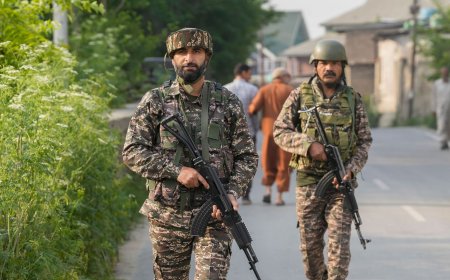All 3 terrorists neutralised in Operation Mahadev were involved in Pahalgam attack: Amit Shah
Union Home Minister Amit Shah confirms all terrorists killed in Operation Mahadev were involved in the Pahalgam terror attack. The operation marks a major win for Indian forces in Jammu & Kashmir.

New Delhi, July 30, 2025 – Union Home Minister Amit Shah on Tuesday confirmed that all three terrorists eliminated during Operation Mahadev in Jammu and Kashmir’s Kulgam district were directly involved in the recent Pahalgam terror attack. Addressing the media in New Delhi, Shah hailed the security forces for their swift and precise operation that culminated in what he described as a “decisive blow” to Pakistan-backed terrorism in the Valley.
The statement comes days after the coordinated assault by terrorists in Pahalgam that left seven civilians and two security personnel dead, sparking nationwide outrage and renewed calls for stringent counterterrorism measures.
High-Stakes Operation Ends in Success
Operation Mahadev, launched in the early hours of July 28, was a joint effort between the Indian Army, Jammu & Kashmir Police, and the Central Reserve Police Force (CRPF). The terrorists were cornered in the forested region of Modergam in Kulgam, a known infiltration corridor used by groups linked to Lashkar-e-Taiba (LeT) and Jaish-e-Mohammed (JeM).
“Based on precise human and technical intelligence, our forces neutralised three terrorists within 36 hours without any civilian casualties. All three were foreign nationals and heavily armed,” said Director General of Police (J&K) R.R. Swain in a press briefing.
Direct Involvement in Pahalgam Attack
Confirming the link to the Pahalgam incident, Amit Shah revealed that forensic and communication evidence pointed to these operatives being part of the planning and execution team of the July 21 attack.
"Initial investigations, including intercepted audio and geolocation metadata, confirm that these terrorists had infiltrated via the Uri sector in early July and subsequently orchestrated the Pahalgam ambush,” Shah said. He also added that one of the neutralised individuals, code-named Abu Hamza, was a “high-value target” who had previously coordinated attacks in south Kashmir.
Security Analysts Weigh In
Security experts view the successful conclusion of Operation Mahadev as a morale booster for the Indian intelligence and military community.
“This operation sends a strong message to Pakistan-based terror outfits. It shows how Indian forces are integrating real-time intelligence, drone surveillance, and ground coordination to dismantle cross-border terror networks,” said Lt. Gen. Syed Ata Hasnain (Retd.), a former GOC of the Indian Army’s 15 Corps.
Ritika Mehra, Senior Fellow at the Institute of Conflict Studies, added, “What’s notable is the political and operational synergy. The Ministry of Home Affairs is ensuring quick declassification of information to keep the public informed while security agencies execute with clinical precision.”
Market Reaction and Strategic Outlook
While the immediate impact of such incidents on markets tends to be muted, geopolitical stability remains a key concern for foreign investors, especially in sectors like tourism, infrastructure, and defense manufacturing.
“The Valley saw a minor decline in tourism bookings post-Pahalgam attack, but swift counter-operations like this help maintain confidence,” said Ramesh Bhutani, a geopolitical risk consultant with AlphaAxis Advisors.
Markets reacted positively to Shah’s announcement. The NSE’s defense-related stock index gained 0.9% on Wednesday morning, with shares of Bharat Electronics Ltd (BEL) and Hindustan Aeronautics Ltd (HAL) seeing modest upticks.
Foreign investors are likely to closely monitor the security narrative in Kashmir, especially with the upcoming G20 tourism events slated for later this year in Srinagar. “If peace holds, expect a rebound in regional tourism and FDI interest in renewable and infrastructure sectors,” Bhutani added.
Political and Civil Response
Opposition parties have lauded the armed forces for their successful mission while calling for deeper scrutiny of intelligence failures that led to the Pahalgam attack in the first place.
Congress spokesperson Supriya Shrinate stated, “We salute the bravery of our jawans, but also urge the government to take accountability for why these terrorists were able to infiltrate and strike.”
Meanwhile, civil society groups in the Valley observed a day of silence for the Pahalgam victims, while expressing cautious optimism about the current security scenario. Local panchayats urged the administration to maintain vigilance in south Kashmir areas that are increasingly being used as hideouts.
Investor Outlook: A Fragile Equilibrium
For investors eyeing Kashmir as a long-term opportunity in agriculture, horticulture, or ecotourism, stability is key. The swift neutralization of threats will help build trust, but the region remains sensitive to both external provocations and internal disruptions.
“India's firm stance on Kashmir security will continue to be a strong signal for global investors,” said Priya Kaul, a defense and strategic analyst. “However, the peace dividend will only sustain if there is a combination of intelligence dominance, grassroots development, and diplomatic pressure on Pakistan.”
The neutralization of all three perpetrators of the Pahalgam terror attack marks a significant operational victory for India’s security forces. It also underscores the Centre’s sharpened counterterrorism strategy in Jammu and Kashmir, even as it continues to grapple with challenges of infiltration and cross-border militancy.
As the Valley inches toward a more stable environment post-Article 370 abrogation, incidents like Operation Mahadev serve both as stark reminders of persistent threats and as powerful affirmations of India’s resolve to eliminate them.
What's Your Reaction?
 Like
0
Like
0
 Dislike
0
Dislike
0
 Love
0
Love
0
 Funny
0
Funny
0
 Angry
0
Angry
0
 Sad
0
Sad
0
 Wow
0
Wow
0












































































